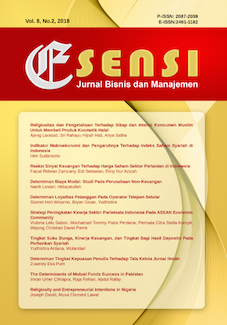Religiosity and Entrepreneurial Intentions in Nigeria
DOI:
https://doi.org/10.15408/ess.v8i2.7331Keywords:
religiosity, entrepreneurial intention, logit modelAbstract
In assessing the influence of religiosity on entrepreneurial intention, and considering other factors such as family entrepreneurial background, personal attitude towards entrepreneurship, societal norms and perceived self-efficacy, the study employed Logistics regression model to analyze 100 cross-sectional data obtained from graduates and undergraduates of economics and business administration. The empirical result indicates that religiosity influence entrepreneurial intentions positively. Equally, the demonstrate the presence of a positive relationship between personal attitude towards entrepreneurship and societal norms, and a negative correlation between self-efficacy and entrepreneurial intentions. The intensity of religious teachings towards enhancing moral values in business and entrepreneurial intentions and the provision of loans and creation of enabling a business environment for intending entrepreneurs therefore recommended.
DOI: 10.15408/ess.v8i2.7331
References
Abdullah, J., Asharaf, M. R., & Syahidawati, S. (2011). The Four Introductory Theories of Fiqh Muamalat. Nilai: Wisdom Publication.
Abdullahi, A. I., Zainol, F.A., Daud, W. N. W., & Yazid, A. S. (2017). Entrepreneurial Intention Revisited: Measuring the Impact of Socio-Cultural Business Environment using Structural Equation Modeling. World Applied Sciences Journal. Vol. 35(8): 1445-1456. doi: https://doi.org/10.5829/idosi.wasj. 2017.1445.1456.
Alkire, S. (2006). Religion and development. In Clarke, D. A. (Ed.). The Elgar Companion to Development Studies. Cheltenham: Edward Elgar.
Asare-Kyire, L., He, Z., Owusu, A., & Junaid, D. (2016). Religious Impact on the Performance of Entrepreneurs: A Comparative Study of Male and Female in Sub-Saharan Africa. European Journal of Business and Management. Vol. 8(35): 85-91.
Audretsch, D. B., Boente, W. & Tamvada, J. P. (2013). Religion, Social Class, and Entrepreneurial Choice. Journal of Business Venturing. Vol. 28(6): 774–789.
AYE Online (2017). Biblical entrepreneurship – The purpose of a Christian entrepreneur. Africa’s Young Entrepreneurs. Retrieved from https://ayeonline.org/2017/01/17/biblical-entrepreneurship-thepurpose-of-christian-entrepreneur-6/
Beckford, J. A. (2003). Social Theory and Religion. Cambridge: Cambridge University Press.
Bwisa, H. M., & Ndolo, J. M. (2011). Culture as a Factor in Entrepreneurship Development: A Case Study of The Kamba Culture of Kenya. Opinion. Vol. 1 (1): 20-29.
Deepika, D. R. (2017). Religious Diversity and Entrepreneurial Intentions: A Macro-level Analysis. (Unpublished Thesis). Kristiansand: University of Agder.
Deneulin, S., & Rakodi, C. (2011). Revisiting Religion: Development Studies Thirty Years On. World Development. Vol. 39(1): 45–54. doi: https://doi.org/ 10.1016/j.worlddev.2010.05.007.
Dodd, S. D., & Seaman, P. T. (1999). Religion and Enterprise: An Introductory Exploration. Entrepreneurship Theory and Practice. Vol. 23(1): 71-86. doi: https://doi.org/10.1177/104225879802300104.
Dodd, S. D., & Gotsis, G. (2007). The Interrelationships Between Entrepreneurship and Religion. The International Journal of Entrepreneurship and Innovation. Vol. 8(2): 93-104. doi: https://doi.org/10.5367/000000007780808066.
Henley, A. (2016). Does Religion Influence Entrepreneurial Behaviour?. International Small Business Journal. Vol. 35(5): 597-617. doi: https:// doi.org/10.1177/0266242616656748
Isa, A., & Shitu, S. (2015). Impact of religion on entrepreneurial intention of university students in Kano state, Nigeria. Proceedings of ICIC2015–International Conference on Empowering Civilization in the 21st Century.
Khraim, H. (2010). Measuring Religiosity in Consumer Research from an Islamic Perspective. International Journal of Marketing Studies. Vol. 2(2): 166-179.
Kinjerski, V. M., & Skrypnek, B. J. (2004). Defining Spirit at Work: Finding Common Ground. Journal of Organizational Change Management. Vol. 17(1): 26-42. doi: https://doi.org/10.1108/09534810410511288.
Kothari, H. C. (2013). Impact of Contextual Factors on Entrepreneurial Intention. International Journal of Engineering and Management Research. Vol. 3(6): 76-82.
Oukil, M. S. (2013). Entrepreneurship and Entrepreneurs in an Islamic Context. Journal of Islamic and Human Advanced Research. Vol. 3(3): 115-130.
Mohammed, B. S., Fethi, A., & Djaoued, O. B. (2017). The Influence of Attitude, Subjective Norms and Perceived Behavior Control on Entrepreneurial Intentions: Case of Algerian Students. American Journal of Economics. Vol. 7(6): 274-282. doi: https://doi.org/10.5923/j.economics.20170706.02
Muhammad, A. D., Aliyu, S., & Ahmed, S. (2015). Entrepreneurial Intention among Nigerian University Students. American Journal of Business Education. Vol. 8(4): 239-248.
Nikolova, E., & Simroth, D. (2013). Does Cultural Diversity Help or Hinder Entrepreneurs? Evidence from Eastern Europe and Central Asia. Working Paper No. 158. London: European Bank for Reconstruction and Development.
Owoseni, O. O. (2014). The Influence of Some Personality Factors on Entrepreneurial Intentions. International Journal of Business and Social Science. Vol. 5(1): 278-284.
Riaz, Q., Farrukh, M., Rehman, S., & Ishaqu, M. (2016). Religion and Entrepreneurial Intentions: an Empirical Investigation. International Journal of Advanced and Applied Sciences. Vol. 3(9): 31-36
Samuel, Y. A., Ernest, K., & Awuah, J. B. (2013). An Assessment of Entrepreneurship Intention Among Sunyani Polytechnic Marketing Students. International Review of Management and Marketing. Vol. 3(1): 37-49.
Safiek, M. (2009). Relevancy and Measurement of Religiosity in Customer Behavior Research. International Business Research. Vol. 2(3): 75-84.
Sihombing, S. O. (2016). Does Religious Values Matters in Prediction Youth Entrepreneurial Intention? An Empirical Study in Indonesia. The Social Sciences. Vol. 11(6): 7325-7329.
Tiwari, P., Bhat, A. K. & Tikoria, J. (2017). An Empirical Analysis of The Factors Affecting Social Entrepreneurial Intentions. Journal of Global Entrepreneurship Research. Vol. 7(9): 1-25. doi: https://doi.org/ 10.1186/s40497-017-0067-1
Tracey, P. (2012). Religion and Organization: A Critical Review of Current Trends and Future Directions. The Academy of Management Annals. Vol. 6(1): 87-134.
Valliere, D. (2008). Exploring Buddhist Influence on The Entrepreneurial Decision. International Journal of Entrepreneurial Behavior and Research. Vol. 14(3): 172-191.
Weber, M. (1922). The Theory of Social and Economic Organisation. New York: The Free Press.
Wibowo, B. (2017). Religiosity and Entrepreneurial Intention. Etikonomi. Vol. 16(2): 187-206. doi: https://doi.org/10.15408/etk.v16i2.4963.
Youcef, S., Djelloul, C., & Mokhtar, I. (2015). The Impact of Religious Dimension on Entrepreneurial Intention by Using PLS Approach - Case Study. Economics World. Vol. 3(5-6): 137-144. doi: https://doi.org/10.17265/2328-7144 /2015.0506.003
Zelekha, Y., Avnimelech, G., & Sharabi, E. (2014). Religious Institutions and Entrepreneurship. Small Business Economics. Vol. 42(4): 747-767. doi: https://doi.org/10.1007/s11187-013-9496-6.


